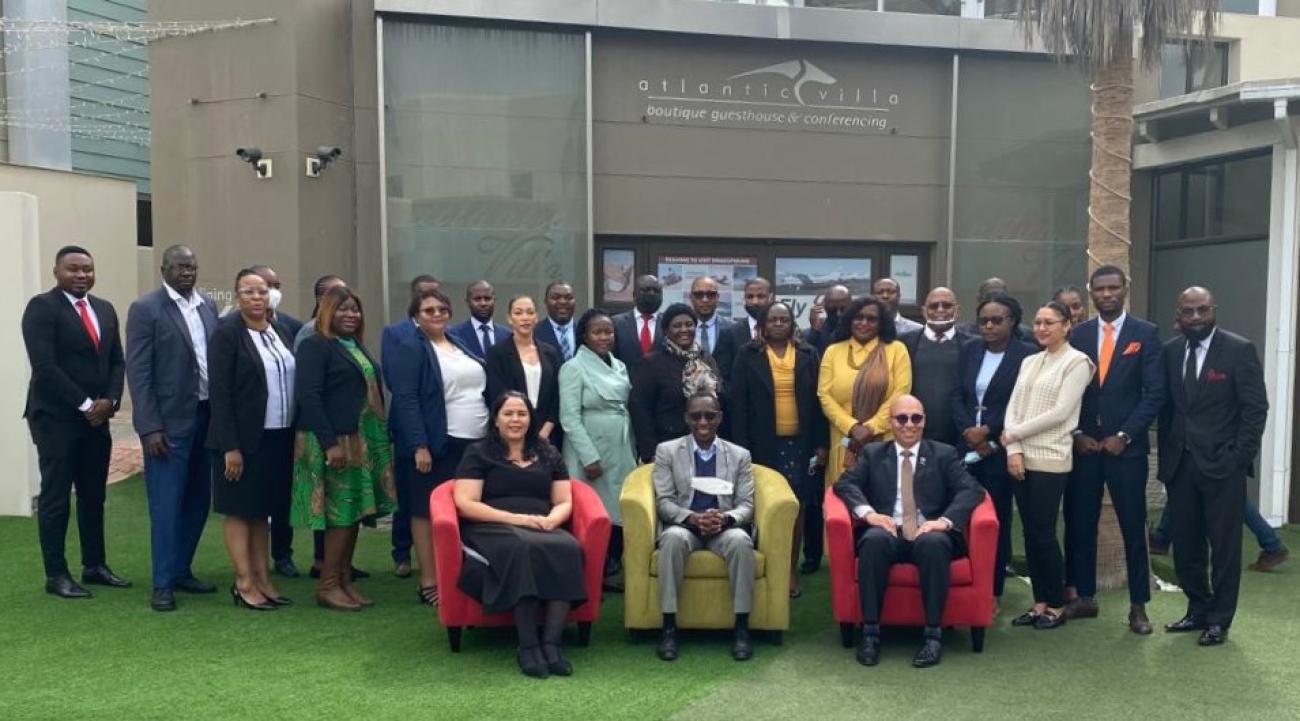Namibia is one of the 12 countries in Africa that is participating in a pilot to measure IFFs, under the Development Account project entitled “Defining, estimating and disseminating statistics on illicit financial flows (IFFs) in Africa” led jointly by the UNECA, UNCTAD and UNODC, with the support of UN Namibia, under the leadership of the Bank of Namibia (BoN) as the National Focal Point.
Participants at the consultative meeting comprised officials from the Bank of Namibia (BoN), Financial Intelligence Center (FIC), Namibia Revenue Agency (NamRa), National Planning Commission (NPC), Ministry of Fisheries and Marine Resources, Ministry of Mines and Energy, Namibia Financial Institutions Supervisory Authority (NAMFISA), Anti-Corruption Commission (ACC), Namibian Police (Nampol), United Nations Agencies, among others.
IFFs are a development challenge, raising serious constraints to financing development: They constitute a drain on Africa’s revenues by diverting resources from social spending and productive investment. Since there was no globally accepted methodology to measure IFFs, UNCTAD and UNODC, the custodian agencies of SDG indicator 16.4.1, released a Conceptual Framework for the Statistical Measurement of IFFs in October 2020. In May 2021, UNCTAD finalized the draft Methodological Guidelines to Measure Tax and Commercial IFFs for pilot testing by national statistical offices and government agencies with the mandate to collect and access relevant data.
The Development Account project aims to consolidate existing and testing new methodological guidelines for the measurement of Sustainable Development Goals (SDG) indicator 16.4.1 on IFFs, as well as building statistical capacity through technical assistance and guidance to pilot countries for the measurement of the same. This will enable African pilot countries to track and estimate the means, magnitude, and channels of IFFs and enable estimates for future reporting in the context of the 2030 Agenda.
In his Opening Remarks, Hon. Mr. Neville Andre, Governor of the Erongo Region stated that “Tax crimes, money laundering and illicit flows are part of a complex phenomenon which is undermining good governance, ethical politics, government and civil society programs intended to promote inclusive growth, reduce inequality and improve the standard of living of the poor on this continent and elsewhere in the world…. in recognition of the matter, Namibia prioritized the need to identify, stop and eliminate these flows out of Namibia, giving effect to the sterling work done by our Government, the International Development partners, the Bank of Namibia and the Financial institutions in Namibia.”
Delivering remarks on behalf of the Deputy Governor of the Bank of Namibia, Mr. Bryan Eiseb, Director at BoN noted that “IFFs include many different concepts, from tax avoidance and tax evasion to money laundering and corruption. The current estimations and occurrence of IFF in most if not all jurisdictions measured by a common approach adopted by experts tend to apportion a percentage, usually of 2-5% of GDP to crimes that generate proceeds, with most of the assets destined to be laundered through the financial sector in particular. Research also indicates an upward trend in the values of capital of criminal origin channelled into the financial sectors of OECD member countries, with the proportion nearing an average of 2% of GDP per year and reaching 3.5% to 4% for certain countries. This means that the measure of IFF as a percentage of GDP is relatively high. Namibia is not immune to IFFs…. IFFs need to be measured to understand the related flows, destinations, and motivations thereof. It is worth re-iterating that the Namibian Government’s commitment and resolve are unquestionable.”
Speaking on behalf of the UN, Ms. Rachel Odede, UNICEF Representative and RC a.i committed “Measuring IFFs has risen to the forefront of both policy and statistical agendas in the context of the 2030 Agenda for Sustainable Development. This resonates well with the UNSDG Fund Joint Programme (JP) which the government of Namibia is implementing, with support from the UN. As UN Namibia, we join our colleagues at UNECA, UNCTAD and UNODC to offer our utmost support and commitment to this project, as it seeks to build national capacity to measure IFFs.
As an on outcome, the particiapnts developed a workplan for the study and constituted the National Technical Working Group (TWG). The TWG is expected to lead in data collection, analysis, report writing, and dissemination. Findings of the analysis will inform the Integrated National Financing Strategy of the UNSDG Fund, particularly with regards to the key reforms and capacities needed to curb IFFs in Namibia.
Coverage is at: https://www.youtube.com/watch?v=X7ylEgF1CX8
For Additional Information, contact:
1. Mr. Bryan Eiseb. Director, Bank of Namibia (Bryan.Eiseb@BON.COM.NA )
2. Ms. Penelao Kapenda. Chair, National Inter-Agency Task Force on IFFs (Penelao.Kapenda@BON.COM.NA )
3. Ms. Farzana Sharmin. Economic Affairs Officer, UNECA (sharmin@un.org )
4. Ms. Eunice Ajambo. Economist & Development Coordination Officer. Office of the UN Resident Coordinator. UN Namibia (UNN) (ajambo@un.org)




